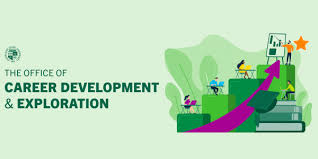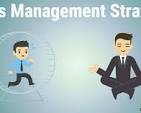The Importance of Career Development
Career development is a crucial aspect of personal growth and professional success. It involves continuously learning new skills, gaining experience, and setting goals to advance in your chosen field. Whether you are just starting your career or looking to make a change, focusing on career development can lead to greater job satisfaction and increased opportunities for advancement.
Benefits of Career Development
Investing in your career development offers numerous benefits:
- Professional Growth: By acquiring new skills and knowledge, you can enhance your expertise and become more valuable in the workplace.
- Increased Job Satisfaction: Advancing in your career and achieving milestones can boost your confidence and overall job satisfaction.
- Career Advancement: Setting clear goals and actively working towards them can open up opportunities for promotions and higher positions.
- Adaptability: Continuous learning allows you to stay relevant in a constantly evolving work environment and adapt to changes more effectively.
- Networking Opportunities: Engaging in career development activities can help you expand your professional network and connect with like-minded individuals.
Tips for Effective Career Development
To maximize the benefits of career development, consider the following tips:
- Set Clear Goals: Define short-term and long-term career goals that align with your interests and aspirations.
- Seek Feedback: Request feedback from mentors, colleagues, or supervisors to identify areas for improvement and growth.
- Continuous Learning: Stay updated on industry trends, attend workshops or seminars, and pursue further education or certifications.
- Build Your Network: Attend networking events, connect with professionals on social media platforms like LinkedIn, and seek mentorship opportunities.
- Show Initiative: Take on challenging projects, volunteer for leadership roles, and demonstrate a strong work ethic to showcase your potential.
In Conclusion
Career development is an ongoing process that requires dedication, effort, and a proactive mindset. By investing in your professional growth, you can unlock new opportunities, enhance your skills, and achieve greater success in your chosen career path. Remember that continuous learning and self-improvement are key components of a fulfilling and rewarding professional journey.
Top 8 Frequently Asked Questions About Career Development
- What are the 5 steps of career development?
- What are the 4 types of career development?
- What is a good career development?
- What are the 5 areas of career development?
- What is career development examples?
- What is meant by career development?
- What are the 4 stages of career development?
- What is career development Why is it important?
What are the 5 steps of career development?
In the realm of career development, understanding the five essential steps can pave the way for a successful professional journey. The first step involves self-assessment, where individuals evaluate their interests, values, and skills to align them with potential career paths. Next comes exploration, where research and information gathering help in identifying suitable industries or roles. Setting clear goals marks the third step, outlining specific objectives and milestones to strive for. The fourth step is skill development, focusing on acquiring new competencies and enhancing existing ones through training or education. Finally, implementation involves taking action towards achieving career goals by networking, seeking opportunities, and continuously adapting to changes in the professional landscape. These five steps serve as a roadmap for individuals looking to navigate their career paths effectively and proactively.
What are the 4 types of career development?
There are four primary types of career development that individuals can focus on to enhance their professional growth and advancement. The first type is skill-based career development, which involves acquiring new skills and knowledge relevant to one’s field. The second type is goal-oriented career development, where individuals set specific career goals and work towards achieving them. The third type is experience-based career development, which involves gaining practical experience through internships, projects, or job rotations. Lastly, the fourth type is networking-based career development, which emphasizes building relationships with professionals in the industry to expand opportunities and gain valuable insights. By understanding and incorporating these four types of career development into their professional journey, individuals can enhance their skills, achieve their goals, gain valuable experience, and expand their network for long-term success.
What is a good career development?
A good career development involves a strategic and proactive approach to advancing one’s professional growth and achieving personal goals. It encompasses setting clear objectives, acquiring relevant skills and knowledge, seeking opportunities for advancement, and continuously learning and adapting to industry trends. A successful career development plan should be tailored to an individual’s interests, strengths, and aspirations, while also considering the current job market demands. By investing in ongoing self-improvement, networking with industry professionals, and taking on new challenges, individuals can create a fulfilling and rewarding career path that aligns with their values and ambitions.
What are the 5 areas of career development?
In the realm of career development, there are five key areas that individuals should focus on to enhance their professional growth and advancement. These areas include skill development, goal setting, networking, continuous learning, and work-life balance. Skill development involves honing existing skills and acquiring new ones to stay competitive in the job market. Setting clear career goals provides direction and motivation for personal progress. Networking helps build valuable connections and opportunities for career advancement. Continuous learning ensures staying current with industry trends and evolving job requirements. Finally, maintaining a healthy work-life balance is essential for overall well-being and sustained success in one’s career journey. Focusing on these five areas can significantly contribute to a fulfilling and prosperous career development path.
What is career development examples?
Career development examples encompass a wide range of activities and strategies aimed at enhancing one’s professional growth and advancement. Some common examples of career development include setting specific career goals, pursuing further education or certifications to acquire new skills, seeking mentorship or coaching to gain guidance and support, networking with industry professionals to expand opportunities, taking on challenging projects to demonstrate capabilities, and actively seeking feedback to identify areas for improvement. Engaging in these career development examples can help individuals progress in their careers, achieve their aspirations, and stay competitive in the ever-evolving job market.
What is meant by career development?
Career development refers to the process of enhancing one’s skills, knowledge, and experiences to advance in their chosen career path. It involves setting clear goals, acquiring new competencies, and seeking opportunities for growth and progression within the workplace. Career development encompasses both personal and professional growth, aiming to improve job performance, increase job satisfaction, and achieve long-term career success. By investing in career development, individuals can effectively navigate their career trajectory, adapt to changing circumstances, and unlock new opportunities for advancement.
What are the 4 stages of career development?
The 4 stages of career development typically include exploration, establishment, maintenance, and disengagement. During the exploration stage, individuals assess their interests, skills, and values to determine potential career paths. The establishment phase involves securing employment, building skills, and establishing a professional reputation. In the maintenance stage, individuals focus on advancing in their careers, gaining experience, and adapting to changes in the workplace. Finally, the disengagement stage may occur as individuals approach retirement or choose to transition into new roles or pursuits. Each stage plays a significant role in shaping an individual’s career trajectory and overall professional development.
What is career development Why is it important?
Career development refers to the ongoing process of acquiring new skills, experiences, and knowledge to enhance one’s professional growth and advancement in their chosen field. It is crucial because it empowers individuals to set clear goals, expand their expertise, and adapt to the changing demands of the workplace. Career development plays a vital role in increasing job satisfaction, unlocking opportunities for career progression, and staying competitive in a dynamic job market. By investing in career development, individuals can continuously improve themselves, increase their value in the workforce, and achieve long-term success in their careers.



